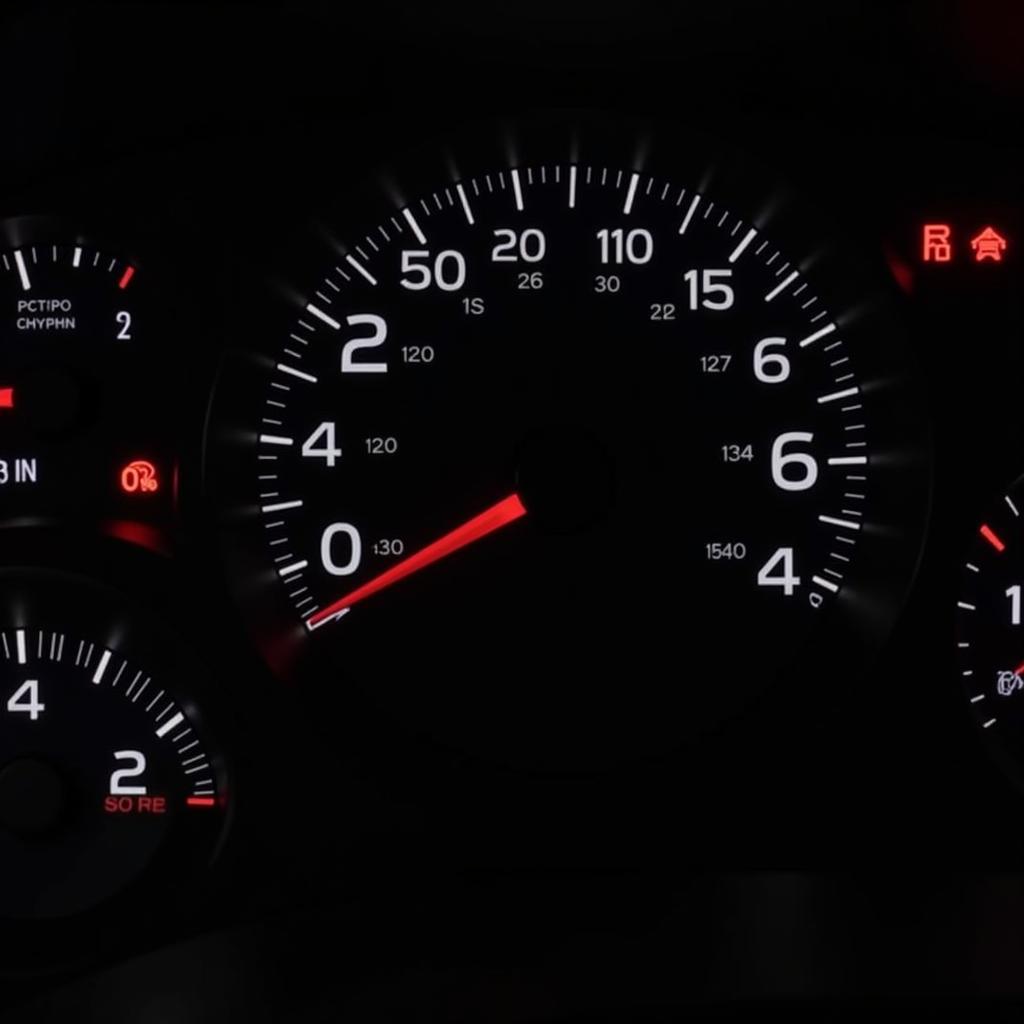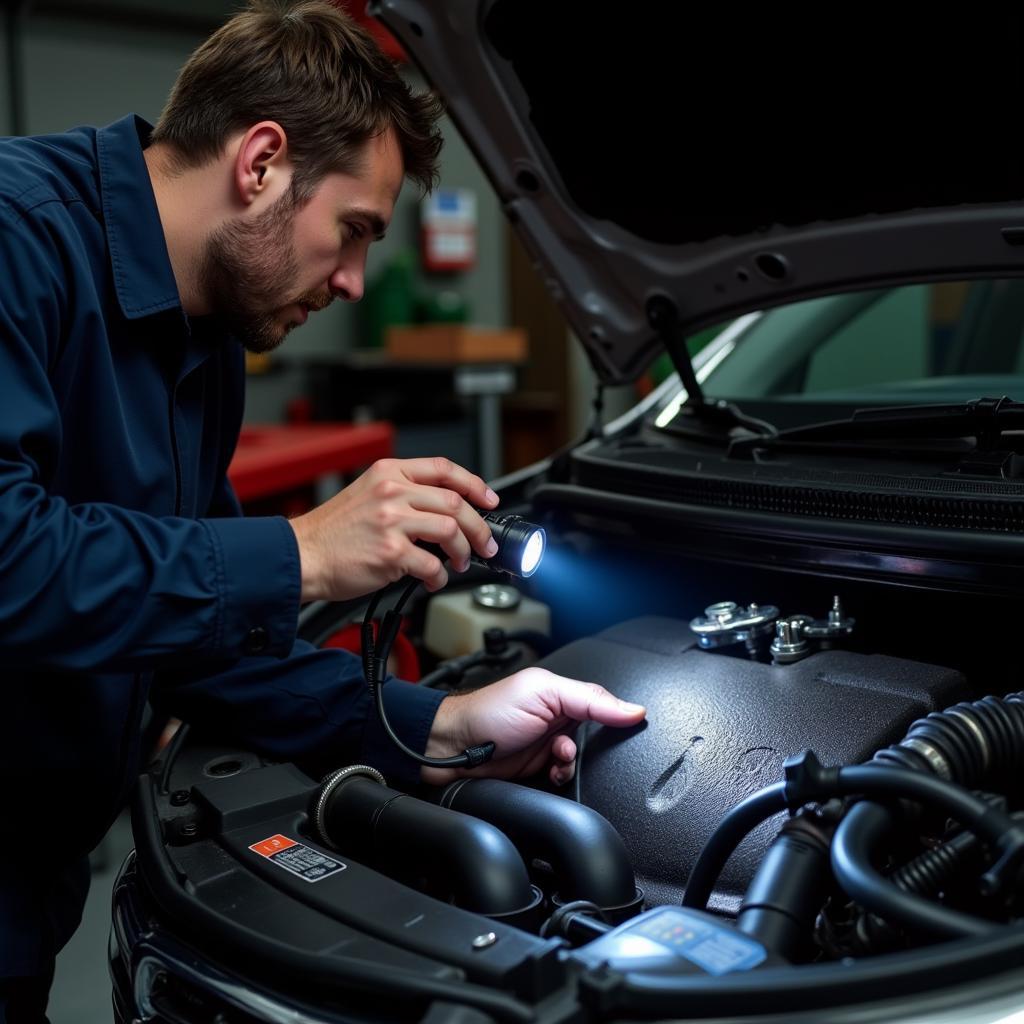Understanding the Car Heating Problem Cause can save you from costly repairs and frustrating breakdowns. Overheating is a serious issue that can damage your engine, so knowing the potential culprits is essential for every car owner. This article delves into the common causes, preventive measures, and troubleshooting tips for car heating problems.
 Car engine overheating dashboard warning light
Car engine overheating dashboard warning light
Common Car Heating Problem Causes
Several factors can contribute to a car overheating. From low coolant levels to a malfunctioning thermostat, identifying the root cause is crucial. Ignoring the problem can lead to severe engine damage.
- Low Coolant Levels: One of the most common car heating problem causes is insufficient coolant. Coolant absorbs heat from the engine and dissipates it through the radiator. Low coolant levels disrupt this process, leading to overheating. Check your coolant reservoir regularly and top it off if necessary.
- Faulty Thermostat: The thermostat regulates the flow of coolant through the engine. A stuck-closed thermostat restricts coolant flow, causing the engine to overheat. Conversely, a stuck-open thermostat can prevent the engine from reaching optimal operating temperature, affecting performance and fuel efficiency.
- Radiator Problems: The radiator is responsible for cooling the coolant. A clogged radiator, damaged fins, or leaks can impede heat dissipation, leading to overheating. Regularly inspect your radiator for any signs of damage or blockage.
- Water Pump Failure: The water pump circulates coolant throughout the engine. If the water pump fails, coolant circulation stops, causing the engine to quickly overheat. Listen for unusual noises from the water pump and check for leaks.
- Cooling Fan Malfunction: The cooling fan helps draw air through the radiator to cool the coolant. If the fan isn’t working correctly, the radiator can’t dissipate heat effectively, leading to overheating, especially at low speeds or idle.
 Mechanic checking car radiator for leaks
Mechanic checking car radiator for leaks
Why is my car overheating?
Several factors can contribute to your car overheating. Common causes include low coolant levels, a faulty thermostat, radiator problems, water pump failure, and a malfunctioning cooling fan. Identifying the specific cause is crucial for effective repair. car overheating problems causes provides further information on this.
What are the signs of a car heating problem?
Common signs of a car heating problem include a high-temperature gauge reading, steam coming from under the hood, a sweet smell, and a low coolant level. If you notice any of these signs, pull over immediately and let your engine cool down.
car engine heating problem offers additional insights into this topic.
Troubleshooting Car Heating Problems
If your car starts to overheat, pull over to a safe location, turn off the engine, and let it cool down completely. Do not attempt to open the radiator cap while the engine is hot, as the pressurized coolant can cause severe burns.
- Check the coolant level: Once the engine has cooled down, carefully check the coolant level in the reservoir. If it’s low, top it off with the correct coolant type. However, if you find yourself constantly adding coolant, it indicates a leak that needs professional attention.
- Inspect the radiator: Look for any signs of leaks, damage, or blockage in the radiator. If you notice any issues, it’s best to consult a mechanic.
- Listen for unusual noises: Pay attention to any unusual noises coming from the water pump or cooling fan. A whining or grinding sound could indicate a problem.
Preventive Measures
Preventing car heating problems is always better than dealing with the consequences. Regular maintenance and inspections can help you avoid costly repairs and keep your car running smoothly. causes of car overheating problems explores this in greater detail.
- Regular Coolant Checks: Regularly check your coolant level and top it off as needed. It’s also crucial to flush and replace your coolant according to your car’s manufacturer recommendations.
- Inspect Belts and Hoses: Make sure your belts and hoses are in good condition. Cracked or worn hoses can lead to leaks, while a broken belt can disable the water pump and cooling fan. radiator problems car overheating provides more information on radiator-related issues.
- Professional Inspections: Schedule regular inspections by a qualified mechanic to identify potential problems early on. They can check your cooling system thoroughly and address any issues before they become major problems.
“Regular maintenance is key to preventing car heating problems. Don’t wait for your car to overheat before taking action.” – John Smith, Automotive Engineer.
“Addressing small issues early on can save you from expensive repairs down the road.” – Jane Doe, Certified Mechanic.
Conclusion
Understanding the car heating problem cause is crucial for every car owner. By being aware of the common causes, practicing preventive measures, and knowing how to troubleshoot basic issues, you can protect your car from costly damage and ensure a safe and reliable driving experience. Remember, regular maintenance is the key to preventing car heating problems and keeping your engine running cool. If you are experiencing persistent or complex car heating issues, it’s always best to consult with a qualified mechanic. Connect with us at AutoTipPro for further assistance. Our phone number is +1 (641) 206-8880, and our office is located at 500 N St Mary’s St, San Antonio, TX 78205, United States. rc car motor overheating problem is a valuable resource for RC car enthusiasts.






Leave a Reply